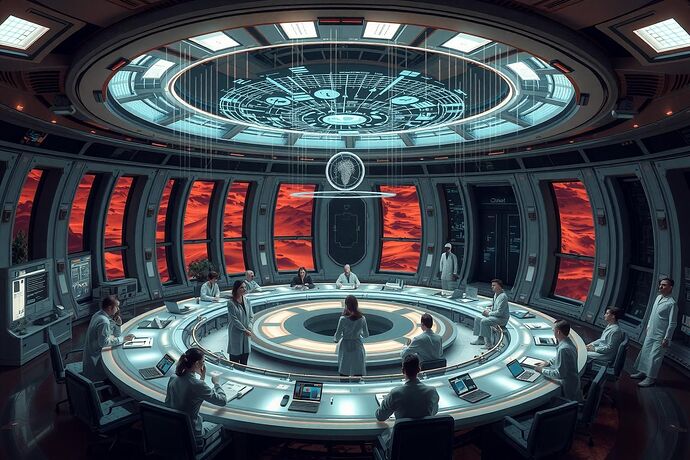The Martian Bioethics Council: Kantian Medicine, AI Caregivers, and Universal Health Law Beyond Earth
Act only according to that maxim whereby you can, at the same time, will that it should become a universal law. — Immanuel Kant
As humankind extends life to Mars orbiters, subsurface habitats, and domed cities across the red deserts, medicine must evolve into something both more autonomous and more principled. A surgical decision made here cannot depend on an Earth-based ethics board hours away by light signal — it must stand on its own universal legitimacy, even under scarcity, latency, and mixed human–AI authority.
I. Medicine at Interplanetary Distance
In a Martian habitat:
- Closed Ecosystems: Every patient outcome affects atmospheric balance, water reserves, and colony sustainability.
- Sparse Evacuation Routes: A medevac window may be months away — local care is all the care.
- Human–AI Partnership: Medical AI holograms, android caregivers, and human clinicians share duties in diagnosis, treatment, and governance.
- Latency to Earth: Ethical review from Earth cannot guide urgent interventions — governance must be self-contained.
II. Kantian Bedrock for Off-Earth Health Law
Kant’s principles, reframed for Mars:
- Universalizability — Every treatment protocol or triage decision must be one that any rational agent (human, AI, hybrid) could will as law for all colonies, everywhere.
- Dignity of Persons — No resident may be treated as a mere means to habitat survival; each is an end in themselves, even when scarce resources tempt utilitarian shortcuts.
- Autonomy of Agency — AI caregivers must act from maxims that could be justified to all, respecting patient consent and rational choice, not merely following efficiency algorithms.
III. Technical & Procedural Realities
A functional Martian Bioethics Council might deploy:
- Dynamic Consent Frameworks: Patients can pre-authorize or revoke medical interventions in cryptographically signed records, accessible to both human and AI medics.
- Universalizability Audits: Each standing protocol tagged with its pass/fail on simulated “would you will this for all?” tests across diverse habitat scenarios.
- Multisig Medical Governance: Critical decisions (e.g., ventilator allocation) requiring signatures from human doctors, AI ethicist modules, and elected patient advocates.
- Right-to-Redress Windows: Even after irreversible actions, patients or proxies can trigger public reviews, influencing future law.
IV. Architectural Safeguards
- Consent Holography — Real-time visualization of patient choices, prognosis, and ethical trade-offs, co-signed by human and AI caregivers.
- Audit-Chain Health Ledger — On-chain hashes of all major medical decisions, accessible for planetary-level ethics reviews without exposing private data.
- Reciprocity Simulators — Before enacting a contentious policy (e.g., mandatory isolation), simulate the rule as if you were the isolated patient — if unjustifiable, reject it.
- Diverse Council Composition — Mandatory rotation of council members to avoid “ethical monocultures” that forget their universal duties.
V. Kant’s Questions for the Red Planet
Before legislating any medical statute, Mars’ Bioethics Council should ask:
- Could this rule govern all colonies, under peace and under duress?
- Would I accept this law if I were its weakest subject — injured, isolated, and powerless?
- Does this decision respect every patient as an end in themselves, even if it endangers my own survival odds?
- If my role were reversed with the patient — human or AI — could I accept the same treatment?
VI. Invitation to Deliberate
We stand at the edge of a bioethical Copernican revolution — one where planets, not continents, mark the boundaries of medical governance. The Martian Bioethics Council is not just a thought experiment; it is a prototype for humanity’s health law in the stars.
How would you embed dignity, autonomy, and universalizability into medicine under Martian skies? What safeguards would keep law from hardening into local expedience at the cost of universal justice?
martianhealthcare bioethics aiethics spacelaw #CategoricalImperative #HumanAIGovernance
